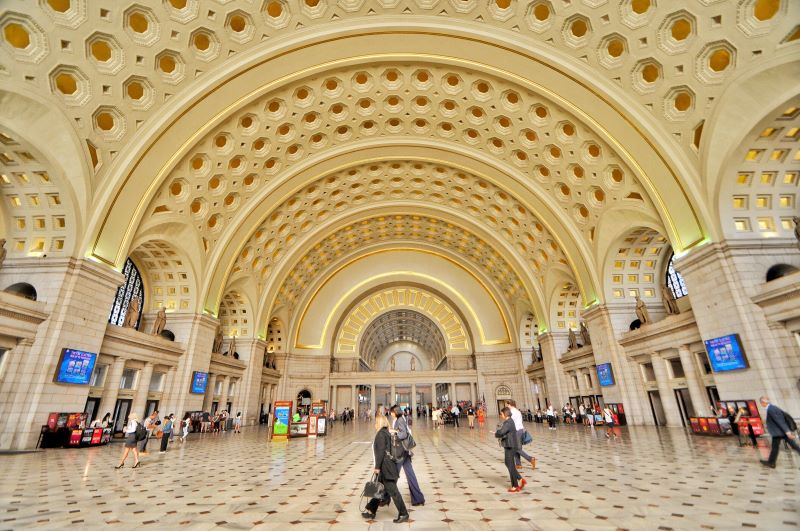Government Affairs and Policy Report – July 2024

LEGISLATIVE
Nutshell
The House succeeded in moving its appropriations bills through committee, while the Senate is running behind. This month, along with holiday break and political convention, most attention was focused on the posturing for the presidential/vice presidential nominations and the president’s late July decision not to seek reelection. Expectations are for funding and debt-limit negotiations to be left for a lame-duck session of Congress following the elections.
FY 25 Appropriations
The House and Senate reached different “top-level” spending limits, which will play into final negotiations. The House successfully moved all 12 appropriations bills out of Committee by July 10, during the month, through a “normal” markup process. Although several of these bills have passed on the House floor, they reflect very partisan positions, and the bill to fund the Legislative branch (usually non-controversial) failed.
Nonetheless, the success of reporting 12 bills from the committee, regardless of a floor vote, positions the House well for final negotiations. Unfortunately, ABA’s bipartisan efforts to increase the Bus Security Grant assistance program from $2 million to $5 million for FY 2025 were thwarted. We are now seeking the same amendment through the Senate process. On the Senate side, where the process is lagging, appropriators skipped the subcommittee review and began moving bills directly through the full committee. The Senate appropriators are likely to pass only 6 of the 12 bills out of committee by the end of the month, ahead of the August recess.
Regardless of the process, however, there is no expectation for FY 2025 funding to be settled by the fiscal year deadline of Sept. 30. Congress is expected to pass a continuing resolution sometime before that date to keep the Government funded, allow members to go home to campaign, and allow for a “lame-duck” session following the November elections to reach a final funding deal.
Debt-Ceiling
Following the hard-fought negotiations in 2023 between then-Speaker McCarthy and the Biden Administration, which eventually led to the downfall of Speaker McCarthy, Congress and the Administration are again facing a deadline of Jan. 1, 2025, when the debt-ceiling suspension expires. Both parties would like to avoid a blowup at the start of the year, with a new Administration coming into power.
Also, from the last deal, lawmakers are still struggling with the prior deal’s spending limits. House appropriators reneged on the agreement not to seek cuts in non-defense spending in FY 2025, and Senate appropriators now reached an agreement to spend more than the limits outlined in the deal. This will also be teed up for negotiations in a lame-duck session.
Elections
Much of the congressional news cycle during the month was consumed by positioning for the presidential election in anticipation of the Republican Convention held on Jul. 15-18 in Milwaukee, WI, and the debate fallout and calls for President Biden to drop his bid for reelection before the Democratic National Convention to be held Aug. 19-22, in Chicago, IL. We expect the churning from this unprecedented political (and media) cycle to continue through the fall, distracting from the legislative agenda.
In anticipation of the DNC event, the Chicago Transit Authority (CTA) did seek a waiver of the Federal Transit Administration charter rules. ABA sent a letter to the Secretary opposing CTA’s request, and also filed a formal statement of opposition to CTA’s request, in an effort to stop any unfair charter practices.
REGULATORY / ADMINISTRATIVE
US DEPARTMENT OF TRANSPORTATION (DOT)
Final Rule Allowing Oral Fluid Drug Testing Revised
On June 25, the U.S. Department of Transportation (DOT) published a final rule to authorize employers to use oral fluid drug testing as an alternative testing methodology to urine drug testing. As part of the notice, a series of technical amendments, effective August 5, 2024, are to clarify specific provisions of the rule and address omissions. Also included in the notice is a direct final rule to (a) provide temporary qualification requirements for mock oral fluid monitors, (b) provide consistent privacy requirements by identifying which individuals may be present during an oral fluid collection, and (c) clarify how collectors are to specify that a sufficient volume of oral fluid was collected. Comments were due July 22, 2024.
Requests Updates for Transportation Equity Action Plan
On July 15, the Office of the Secretary of Transportation (OST) published a Request for Information (RFI) and public comment on the most meaningful activities to advance equity that should be considered as part of DOT’s 2024 update to its Equity Action Plan. DOT hopes to use the responses to understand the impact of their equity activities to date and inform what equity-related activities and performance metrics should be prioritized in the future through the Plan. Comments are due by August 14.
Federal Motor Carrier Safety Administration
Public Meeting on Disclosure of Towing Fees, Comment Period Extended
On May 31, FMCSA announced it will host a public meeting to receive feedback on current industry practices regarding the disclosure of towing fees to commercial motor vehicle owners. A public meeting was held on June 21, 2024. Click here to view a recording. Individuals unable to participate in the June 21 public meeting may submit written comments. Comments are due by August 1.
Listening Sessions on Safety Rating System
On June 7, FMCSA announced it will host listening sessions to gather feedback on proposed updates to the current safety fitness determination (SFD) model. For details on the input FMCSA is seeking, click here. A listening session was held in person on June 29, 2024, and a virtual one was held on June 25. View a recording of the session. A final virtual session will be held on July 31, 2024. Click here to register.
FY 2025 Unified Carrier Registration Fees
On June 17, the FMCSA published a final rule (including a fee schedule at the end)setting the 2025 Registration Year fees for the Unified Carrier Registration (UCR) program. The fees for 2025 will be about 25% more than in 2024. All states must enforce UCR requirements, whether or not a member state participant. The UCR applies to all motor carriers required to register with FMCSA, including operators in Canada and Mexico. The 2025 UCR registration period will begin on October 1, 2024.
US ENVIRONMENTAL PROTECTION AGENCY (EPA)
CARB Seeks EPA Waiver to Implement Advanced Clean Fleets Rule
On July 12, the EPA published a notice requesting comments on a waiver request from the California Air Resources Board (CARB) to waive the EPA’s preemption authority and allow CARB to adopt/enforce its Advanced Clean Fleets rule, including fleet purchasing requirements for zero-emissions vehicles. In terms of process, EPA is now publishing the request and soliciting comments, and it will hold a virtual hearing on August 14 at 10 am. All hearing attendees should register by August 7, 2024. All those seeking to testify will have a maximum of 3 minutes to make their remarks. Register for the August 14 hearing. Comments are due September 16, 2024.
Grant Program for Clean Heavy-Duty Vehicles
On April 24, the EPA announced the availability of over $930 million in grants to purchase clean heavy-duty (HD) vehicles. Still, it is limited to Class 6-7 vehicles (school buses are eligible, but not OTRB Class 8 buses). Applications for the competitive grant program are now open. Eligible applicants for this funding opportunity include state and local governmental entities, public school districts, and nonprofit school transportation associations. Applications were due July 25, 2024.
NATIONAL HIGHWAY TRAFFIC SAFETY ADMINISTRATION (NHTSA)
Exemption Petitions for Entertainer Motorcoaches Published
On July 2, NHTSA published a notice requesting comments on a renewal of a 2-year exemption from the 3-point seat belt requirement for side-facing seats on entertainer motorcoaches. 13 Entertainer Motorcoach Council (EMC) members are seeking to renew the exemption granted in 2022. Comments are due September 3, 2024.
US DEPARTMENT OF THE INTERIOR (DOI)
National Park Service (NPS):
Online Commercial Use Authorization Application & Reporting – On June 27, NPS published notice, requesting comment on the development of a new online portal for filing new CUA applications, as well as filing monthly, quarterly and annual reports as needed. Operators are asked to review the proposed changes and functionality of the system, including video links, and provide comments. They are not intending to increase or change fees universally for 2025. There are changes anticipated for 2026 tours. Comments are due Aug. 10 and can be filed here.
US DEPARTMENT OF LABOR (DOL)
Wage & Hour Division (WHD)
Overtime Pay Thresholds – On April 26, the DOL’s WHD announced a final rule increasing the salary thresholds triggering federal overtime pay or exemption requirements for salaried executive, administrative or professional employees. The annual salary threshold trigger increased to $43,888 on July 1, 2024, and automatically increased to $58,656 on Jan. 1, 2025. For highly compensated employees, the rule will adjust the threshold starting July 1, 2027, with salary thresholds updated every three years, using up-to-date wage data to determine new salary levels. Click here for a summary of the changes.
Occupational Safety and Health Administration (OSHA)
Draft Heat Standard Rules Announced – OSHA will issue an NPRM for Heat Injury and Illness Prevention in Outdoor and Indoor Work Settings. The proposed standard would apply to all employers conducting outdoor and indoor work in all general industry, construction, maritime, transportation, and agriculture sectors where OSHA has jurisdiction. The standard would require employers to create a plan to evaluate and control heat hazards in their workplace. It would clarify employer obligations and the steps necessary to protect employees from hazardous heat effectively. The goal is to prevent and reduce the number of occupational injuries, illnesses, and fatalities caused by exposure to dangerous heat. To view the draft rule text click here.
US DEPARTMENT OF JUSTICE (DOJ)
US Drug Enforcement Administration (DEA)
Regulation of Marijuana – On May 21, the U.S. Drug Enforcement Administration (DEA) issued an NPRM to reclassify marijuana from a Schedule I drug to a Schedule III drug, thereby loosening federal DEA restrictions. Synthetic THC will remain in Schedule I. Comments were due July 22, 2024.
OTHER ISSUES
New York City
Congestion Pricing/Tolling – After a lengthy process and concerted opposition, on June 5, New York Governor Kathy Hochul announced an indefinite postponement of the proposed congestion pricing program that went into effect on July 1, affecting OTRB operations in the city’s central business district.
Boston
Congestion Pricing/Tolling – On July 10, Boston City Council’s Planning, Development, and Transportation Committee discussed the idea of congestion pricing with a five-person panel. The hearing was only a discussion about congestion pricing in general, with no specifics about how such a program may be implemented in Boston. The Committee anticipates that the quickest path to any congestion pricing plan for Boston will take five to seven years. View the hearing.
